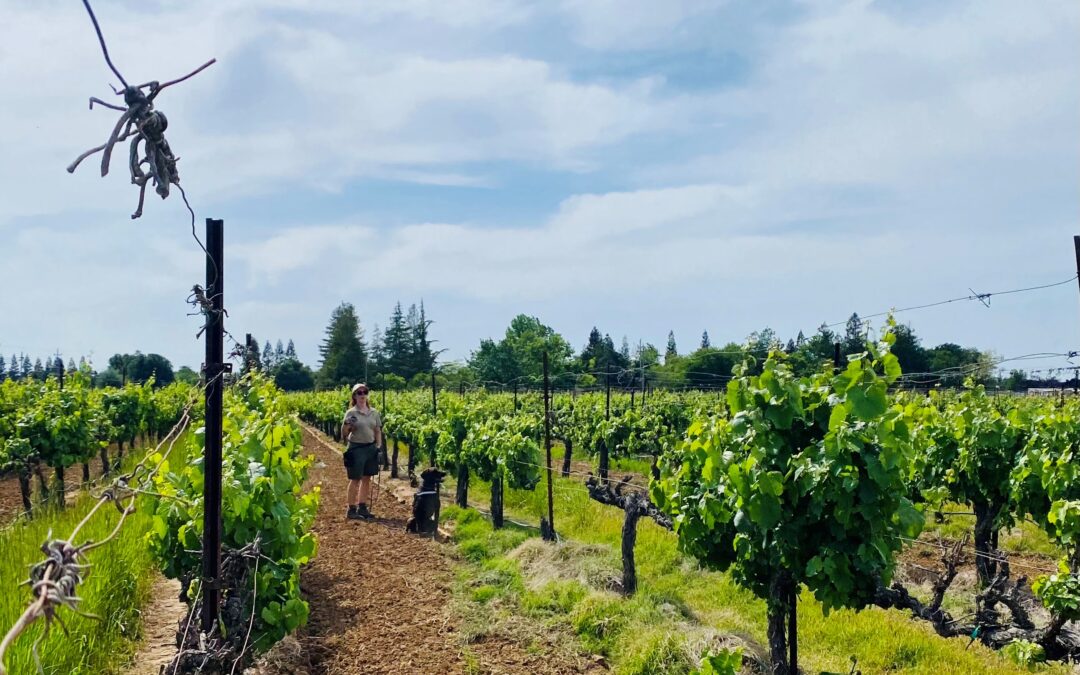MONDAY, JUNE 12, 2023. BY LODI WINEGRAPE COMMISSION.
A team led by the Lodi Winegrape Commission was awarded a $428,111 Department of Pesticide Regulation (DPR) research grant to determine whether the robust olfactory senses of canines can detect vine mealybugs and leafroll virus in nurseries and commercial vineyards. The project combines the unique expertise of canine detection professionals, University of California scientists, and the Lodi Winegrape Commission. Dr. Stephanie Bolton, Grower Research & Education/LODI RULES Sustainable Winegrowing Director for the Commission, will lead the project and serve as the principal investigator.
Explaining how exciting this project is for the world of wine, Dr. Bolton says, “Any threat to the viability of the California winegrape industry – valued at $57.6 billion in annual economic activity according to the California Association of Winegrape Growers – threatens our state’s economy. Our canine detection project aligns well with our efforts to farm sustainably and practice prevention, the core principle of integrated pest management. The title of a Wired article by Spencer Ackerman (2010) showcases the massive untapped potential of canine detection, which we hope to bring more into agriculture: ‘$19 Billion Later, Pentagon’s Best Bomb-Detector is a Dog.’ Dogs are a farmer’s best friend, so this is a fun approach to one of our biggest challenges.”
Leafroll virus is the world’s most destructive grapevine virus. The virus is vectored by the invasive vine mealybug that is spreading the virus at an alarming rate through nursery material, within vineyards, between neighboring vineyards, and across entire regions. Leafroll infections reduce yield and quality of winegrapes, decrease a vineyard’s lifespan, contribute to sudden vine collapse, and make land less suitable for future plantings. Early detection of mealybugs and viruses, as is possible with canines, is critical to reducing pesticide use and fostering long-term sustainability of vineyards.
Dr. Kent Daane (UC) explains the destructive nature of the invasive vine mealybug and tells the story of how it came to California.
The project team includes Dr. Neil McRoberts (University of California, Davis), whose close working relationship with now-retired USDA scientist Dr. Tim Gottwald propelled the original project idea. Dr. Gottwald’s research re-introduced the ancient technique of using dogs to detect pests and diseases in agriculture. The noses of canines are far more powerful than our most expensive scientific equipment, and they can detect pathogens in real-time without the need to sample and destroy plant tissue. This in-field, real-time, large-scale detection of mealybugs and leafroll virus could be a game changer in California’s fight to keep nurseries and vineyards healthy and free from devastating disease.
While Dr. McRoberts serves as the epidemiologist, Ms. Lisa Finke and her staff at Canine Detection Services (Fresno, CA) will conduct proof-of-concept trials to determine if dogs can be trained to detect vine mealybugs and leafroll virus in a vineyard setting. Ms. Finke has extensive experience using canines for bed bug and Asian citrus psyllid detection. The final team member, Dr. Maher Al Rwahnih (Director of Foundation Plant Services), will provide expert technical assistance and virus samples for training.

Ms. Finke rewards a detection canine with some play after a correct identification.
The Lodi Winegrape Commission has been actively studying the California grapevine virus situation since 2002, and this current project builds upon that work. Dr. Bolton has led two collaborative research teams studying mealybugs and viruses which have been instrumental in gathering information, creating educational materials, connecting relevant sectors, and offering real-world, practical outreach for winegrowers across the globe. Funding from the American Vineyard Foundation and the CDFA PD/GWSS Board allowed the Commission to produce a 138-page book called What Every Winegrower Should Know: Viruses.
If successful, canine detection could apply to more pests and diseases in grapes and other crops, and provide a valuable, sustainable pest prevention tool for farmers in California and beyond.
Stuart Spencer, Executive Director of the Lodi Winegrape Commission adds, “We are thankful to the Department of Pesticide Regulation for funding this innovative project that has the potential to benefit the entire California wine and grape industry. The Lodi winegrowing community is proud to be at the forefront of cutting-edge, industry-led research, innovation, and extension.”
To sign up for our grapevine virus email list to stay informed of educational opportunities and research progress, send an email to stephanie@lodiwine.com.
Have something interesting to say? Consider writing a guest blog article!
To subscribe to the Coffee Shop Blog, send an email to stephanie@lodiwine.com with the subject “blog subscribe.”
To join the Lodi Growers email list, send an email to stephanie@lodiwine.com with the subject “grower email subscribe.”
To receive Lodi Grower news and event promotions by mail, send your contact information to stephanie@lodiwine.com or call 209.367.4727.
For more information on the wines of Lodi, visit the Lodi Winegrape Commission’s consumer website, lodiwine.com.
For more information on the LODI RULES Sustainable Winegrowing Program, visit lodigrowers.com/standards or lodirules.org.


